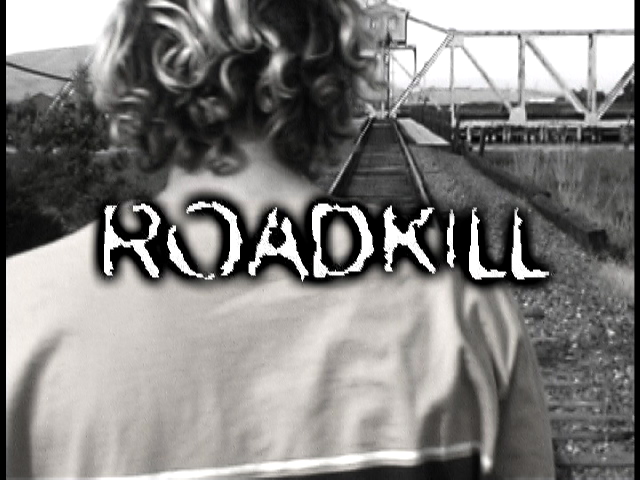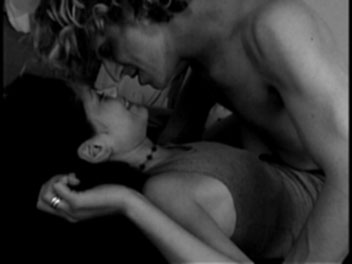Film Review by Phil Hall
for filmthreat.com (4 stars out of five)
“ROADKILL” (2001; 27:00. USA. Antero Alli)
Working without the safety net of a screenplay, Alli conceived the bare bones concept of two couples in love/hate relationships and then put the burden on his cast to flesh out the stories of the rocky relationships. The result is both uncomfortable and cathartic, not unlike the feeling of gazing up a car crash: it is a difficult sight to behold, but it is also too intriguing not to look at and there is also the hidden sensation of knowing the heavy damage belongs to someone else.
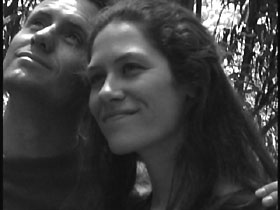
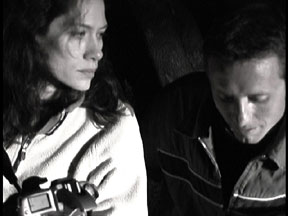
Dana Bergeman and Susan Schramm
Both couples in "Roadkill" are obsessed with art. Paula and Otto (Susan Schramm and Dana Bergeman) are nature photographers who work together in the woods with clinical precision, carefully setting up their tripods and lenses to capture the hidden beauty lurking among the trees. But perhaps they can't see the proverbial forest for the trees...a ring on the cell phone during a photo shoot comes from their rude art gallery contact who brusquely informs them of the termination of their contract with the gallery due to poor sales. On their ride home at the end of the day, they run over a raccoon who wandered into the road. Otto, inexplicably attracted to the dead creature, sets up his tripod and camera and begins to photograph the animal. Paula is left outside of his vision, unable to see what possesses him to photograph the dead raccoon and impotent in her commands to make him stop clicking pictures.
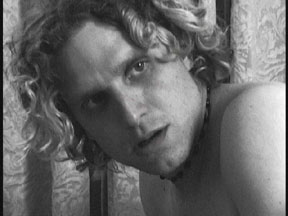
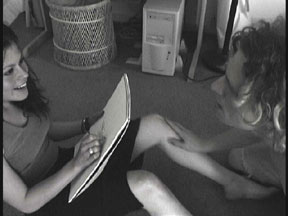
Paul D'Addario (left) Carla Negri and Paul D'Addario (right)
Then there is Clio and Max (Carla Negri and Paul D'Addario). Max's profession is never stated, but professional affiliations means nothing to Clio, who has the shirtless hunk rolling about her in her bedroom. Clio is an artist with a strange habit of halting her lovemaking to sketch Max while he is in the throbs of passion. Max is bemused by her artistic pauses while they punctuate their passion, but in the morning after he views her sketches taped above her bed with disgust. Upset by her creations, he tears them off the wall and crumples them into paper balls. Clio discovers Max's destruction and a heated argument pursues, with neither one allowing the other to state a cogent case for their feelings.
Filmed with a nervous handheld camera (as if the viewer is constantly ducking and weaving around the battling lovers) and laced with a haunting score by the filmmaker's reel life and real life collaborator, Sylvi Alli, "Roadkill" is a work of art focusing on poor souls who stumble because of their mistaken notion that life is a work of art. Of course, life is not art: it is not the perfect photograph, the idyllic landscape, the majestic brush stroke or the clear delineation of hues. It is a sloppy, complicated obstacle course run by less-than-perfect individuals who can't control their environment or those in their orbit, and inevitably lose their tempers when they cannot maintain control.
"Roadkill" is rich with examples of lost emotions. The look of anger and confusion on Paula's face when Otto begins to photograph the dead raccoon mirrors a universal sense of betrayal and self-delusion...how could someone with whom she shares her art and her heart behave in a manner which is antithetical to everything she assumed they shared? The cold distance that Clio keeps from Max the morning after their bodies were locked together as one echoes the ephemeral nature of love...as the cliché aptly puts it, here today and gone tomorrow. Where did the art go? It was replaced by real life, a lesson which the bickering couples may or may not truly absorb.
"Roadkill," as with the other films created by Alli, rings with a healthy and (in view of most films) jolting sense of maturity. His message is haunting: we cannot communicate if we don't understand who we are speaking to and if we don't listen to the responses we get back. Parallel conversations which never intersect ultimately lead to hurt feelings and simmering anger. The anger that flows in "Roadkill" never reaches a full lethal boil, but it burns nonetheless. This is an excellent short film.
**** (four stars out of five)
ANTERO ALLI - VISION STATEMENT
